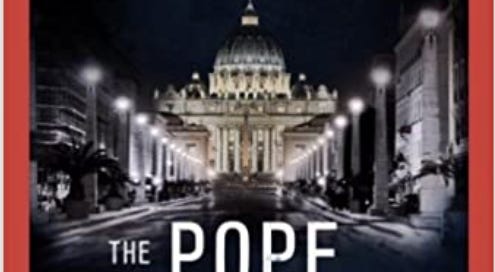History Bookclub APR-2022
Even though I am on a break from posting, my bookclub reviews will still happen.
Our book for review was “The Pope and Mussolini” by David I Kertzer. The author won the Pulitzer Prize for Biography or Autobiography in 2015 for this book. I was familiar with the book but had never read it. I was sure I had heard an interview about it. As a listener of NPR, I found this long-form interview with Kertzer. I noted that he has been a frequent interview on Fresh Air. I listened to the interview on the treadmill one day AFTER reading the book myself.
This book is about the complex political, moral and ethical relationship between Benito Mussolini and Pope Pius XI. Whenever I read books of this sort, I often return to the expression “you cannot serve two masters”. Mussolini (and Hitler and Stalin) seem to be characters with an almost singular focus. Pope Pius XI emerges as a more complex and even tragic character. The Church as an institution is difficult to understand. Is it focused on “saving souls”? Is it focused on retaining political power and influence? Is it trapped by its past and unable to openly state its position perhaps because it is built on very long traditions?
Mr. Kertzer writes of the important era in Europe and specifically Italy as Ambrogio Damiano Achille Ratti (Pope Pius XI) is elevated to succeed Pope Benedict XV in 1922. Ratti had only recently become a Cardinal in 1921. Benito Mussolini would rise to power in 1922 also and became known as Il Duce. The whole world had suffered post World War I and the economic tumult of the 1920s. Italy would go down the path of fascism while Communism would emerge elsewhere. Desperation led many to choose authoritarianism. Despite being an anti-cleric, Mussolini and Pius XI became allies in their contempt for democracy and individual rights.
The author is a recognized expert on the Papacy in the period from the 1870s forward as Italy becomes the last country in Europe to embrace individual freedoms and democracy, in strong opposition to the Roman Catholic Church. Until Hitler begins to exert great pressure on the relationship with Italy, Mussolini and the Pope are cooperative with common interests and outlooks.
My Opinion (The Good & The Bad)
It is clear that Kertzer brings a point of view (and perhaps a bias) to a topic which he is a recognized expert. I think the story of the Papacy and its outsized influence on one country was well analyzed and presented. I think anyone wanting to understand the emergence of Fascism and the surprising common ground it might have with a religion that wishes to dictate to its subjects should consider reading this book a worthwhile effort.
The Bad
I wrote the bad after attending the book club meeting and an insightful set of comments from some of the members. It is a tribute to the range of understanding and scholarship of our club members that we even discussed the book’s relative glossing of the the Mit brennender Sorge encyclical focused on Church and Nazi relations in the 1930s. Mr. Kertzer has become an acknowledged expert in the historical study of Roman Catholicism and its difficult relationship with Judaism. The book focuses on the role of broad anti-Semitism in Europe and throughout the world. I think the book might have been a bit more balanced.
The Good
There is depth to this book despite it not being very long. Despite the difficulties of all of the names (including the Pope aliases), Kertzer does a GREAT job in telling a multi-decade story. He takes us through the rise and fall of these tragic and conflicted men and their impact on the world.
Mussolini is a strange and arrogant narcissist. It is amazing to me that such garish characters have appealed to people through the ages. In both of the men’s case, Kertzer provides tidbits of their lives and how their behaviors exhibited their greater character.
Is It Worth A Read
The book was well-received at the club but I would have recommended it regardless of the club impression. While a small point, the book includes great photographs and provides them in the context of the reading at the place of discussion in the book rather than just a block of photos encapsulating two decades. The type was quite small so for those interested, you may want to consider it as an eBook or find a large type version. I rated this book 9.5 out of 10.
What I Learned at the Meeting
As I stated earlier, a couple of the members pointed out the shading of some of the important moments when perhaps a more balanced view of the Pope might have emerged. By a large margin though, the book was well received and the thorough research was referenced by many. I think most all of us learned about Benito Mussolini and the backroom dealings of the Papacy.
We had about seventeen people in attendance, a fine showing again and a wonderful excuse to get out on a Tuesday night. In a change of pace, the woman who recommended the book spoke last. I thought that a nice change of pace and “D” described the original appeal of the book and could certainly go home knowing that the book club enjoyed her recommendation.
Tonight’s song emerged as the great anti-fascist anthem in Italy. I just love the way it sounds. The title is Bella Ciao.
WHAT’S NEXT?
My sabbatical from writing continues so I cannot say what is next.




